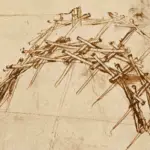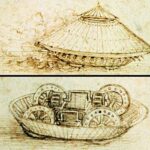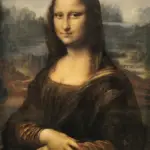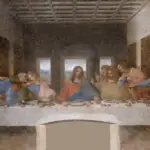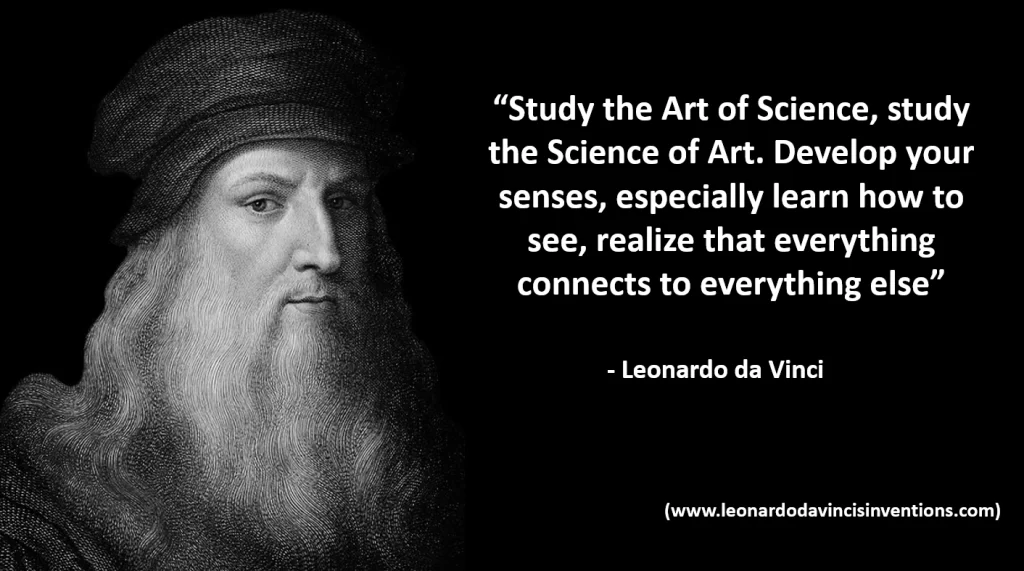
Leonardo da Vinci Quotes
One of the most famous Leonardo da Vinci quotes: “Once you have tasted flight, you will forever walk the earth with your eyes turned skyward, for there you have been, and there you will always long to return.”
This Leonardo da Vinci flight quote mirrors his obsession with flight and provides a metaphor for human ambition and the endless pursuit of dreams.
Leonardo da Vinci‘s perspective on learning and love, encapsulated in his quotes, provides timeless wisdom. These quotes often resonate with readers, making them relevant and strikingly profound even today.
His words transcend beyond mere da Vinci quotes. Leonardo’s quotes offer insight into the mind of a genius, one whose ideas were far ahead of his time. They testify to his relentless curiosity and desire to understand the natural world and the human condition.
Leonardo da Vinci’s Most Renowned Quote
Of the multitude of thought-provoking Leonardo da Vinci quotes, one stands out for its poignant wisdom and profound insight into Leonardo’s outlook on life and his work.
Understanding Leonardo’s Signature Quote
Arguably, the most famous Leonardo da Vinci quote goes like this: “Simplicity is the ultimate sophistication.” This quote is a testament to Leonardo’s philosophy, where he found beauty and brilliance in the simplest things.
Leonardo was known for his meticulous nature. He believed every detail mattered, from the minute details in his paintings to the intricate designs of his inventions. His sketchbooks, filled with elaborate diagrams and descriptions, exemplify this dedication to detail.
However, his genius lay in his ability to render complex ideas and designs into simple, understandable forms. Hence, the “Leonardo da Vinci’s simplicity quote” aptly reflects his ethos.
Relating the Quote to Leonardo’s Life and Works
The relevance of this quote becomes even more evident when we consider Leonardo’s work. Consider the Mona Lisa, arguably the most famous painting in the world.
What makes it so captivating isn’t just the precision and detail but the simplicity of the subject’s expression—a gentle, enigmatic smile. This perfectly illustrates Leonardo da Vinci’s simple quote in action.
This philosophy is echoed in Leonardo’s inventions and artwork. Though complex and revolutionary, his designs were rooted in simplicity and functionality.
The flying machine, for instance, was inspired by the simple observation of bird flight, again underscoring his belief that ‘Simplicity is the ultimate sophistication.’
Leonardo da Vinci Motto
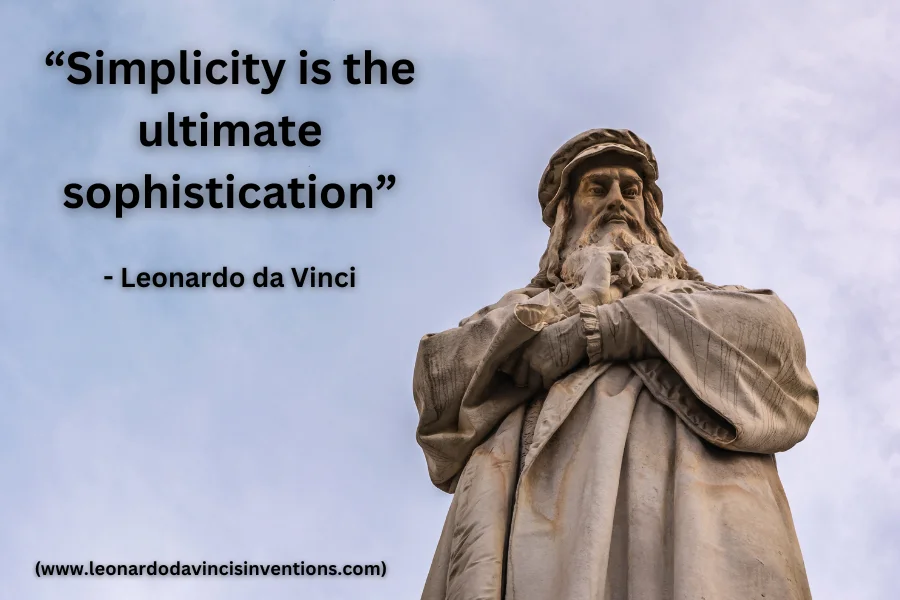
Apart from his quotes, Leonardo da Vinci’s motto is another fascinating aspect of his legacy. This phrase captures Leonardo’s spirit and provides an intimate view of his philosophical orientation.
Deciphering the Motto
Leonardo da Vinci’s motto, “Ostinato Rigore,” translates to “Obstinate Rigour” in English. Although this motto might initially seem puzzling, it makes perfect sense in light of Leonardo’s life and works.
One might argue that “Ostinato Rigore” is more than just a motto for Leonardo; it was his way of life. His dogged determination to pursue accuracy, precision, and in-depth understanding is well documented in his numerous sketches, detailed notes, and exceptional artwork and inventions.
Leonardo was obstinate in his quest for knowledge and rigorous in his methodology, making “Ostinato Rigore” an apt representation of his approach to everything he undertook.
Tying the Motto to Leonardo’s Philosophy and Approach
Looking at Leonardo’s life and his approach to his work, his motto becomes a beacon that sheds light on his overall philosophy. As we’ve seen with his most famous quote, Leonardo revered simplicity.
However, this simplicity was not achieved without rigorous attention to detail and an unwavering pursuit of understanding. His motto, “Leonardo da Vinci Ostinato Rigore,” perfectly encapsulates this dedication.
For example, consider his masterpiece The Last Supper. He didn’t merely aim to create a visually pleasing representation of the scene.
Instead, he painstakingly studied the dynamics of human emotion and group interaction, resulting in a masterpiece that captures the tumultuous scene with unparalleled realism and depth. His obstinate rigor truly shines through.
14 Best Leonardo da Vinci Quotes about Art and Science
Study the Art of Science, study the Science of Art. Develop your senses, especially learn how to see, realize that everything connects to everything else
He suggests by studying both the art and science of a subject, and by developing one’s senses, particularly the sense of sight, one can gain a deeper understanding of the world and the connections between different things.
The quote implies everything is interconnected, and gaining knowledge from different perspectives can give one a more comprehensive understanding of the world.
Art is never finished, only abandoned
The quote implies the artist may never be delighted with their work, and the creative process is always open to new ideas and possibilities. It also means that the artist can always come back to the work and make changes, but at some point, the artist may have to abandon the work as it is and move on.
Science is the captain, and practice the soldiers
The quote suggests that having a strong theoretical foundation is necessary for successful practical application. Science is the captain that guides and directs the practice, the soldiers, to achieve the desired results. It implies that one needs to understand the principles behind a certain thing before applying it.
The human foot is a masterpiece of engineering and a work of art
The quote suggests that the human foot is a complex and elegant creation worthy of admiration and study. He draws a parallel between the human foot and art, both resulting from great engineering and possessing beauty in their own way.
Experience never errs; it is only your judgments that err by promising themselves effects such as are not caused by your experiments
He says that experience, or the accumulation of knowledge and observations, is always accurate and reliable, whereas human judgments and predictions can be flawed. He points out that sometimes our decisions may promise results not supported by our experiences and observations.
The quote suggests that we should rely on our experiences and observations rather than our predictions and judgments. It is also a reminder that our understanding of the world is limited and that we should be open to new information and willing to revise our beliefs in light of new evidence.
The length of a man’s outspread arms is equal to his height
This is known as the Vitruvian Man, a 1490 drawing by Leonardo da Vinci. The drawing is based on the writings of the Roman architect Vitruvius, who believed that the ideal human figure should fit within a circle and a square.
This quote suggests that the human body has a specific proportion and can be used as a guide for measurement and design. It also implies that the human body is a perfect example of symmetry and harmony.
A beautiful body perishes, but a work of art dies not
The quote suggests that art has a lasting impact and can outlast the physical body. It also implies that art can transcend time and space and that it can be appreciated and admired by generations to come. Additionally, it emphasizes that beauty is not only skin deep and that something beautiful can last much longer than the physical body.
Where the spirit does not work with the hand, there is no art
The quote suggests that art is not only a physical act but also a mental and emotional one. It implies that the artist’s inner feelings, thoughts, and emotions must be present during the creative process for the work to be considered true art.
It also suggests that art is a form of self-expression and must come from the heart and not only from the hands.
The smallest feline is a masterpiece
The quote suggests that beauty and perfection can be found in even the most minor and most unexpected places. It implies that every creature and being in this world has something special and unique about them, which makes them a masterpiece in their own right.
It also serves as a reminder that we should not take anything or anyone for granted and should appreciate the beauty in everything around us.
Painting is concerned with all the 10 attributes of sight; which are: Darkness, Light, Solidity and Colour, Form and Position, Distance and Propinquity, Motion and Rest
This quote suggests that painting should consider all the elements of visual perception to be a complete and flourishing art form. It implies that the painter should consider the subject matter and how the light and darkness, color, form, position, distance, proximity, motion, and rest of the subject interact to create a cohesive and believable visual experience.
It also highlights the importance of understanding the science of perception in art and how it can be used to create a more realistic and believable representation of the world.
The human bird shall take his first flight, filling the world with amazement, all writings with his fame, and bringing eternal glory to the nest whence he sprang
The quote expresses his belief in humankind’s potential to achieve great things and overcome physical limitations, bringing fame and glory to their origins. It implies that the development of human technology and the exploration of new frontiers can bring fame and glory to where humans came from.
It also serves as a reminder that the human race is capable of great things and should never stop striving for progress and advancement.
I have always felt it is my destiny to build a machine that would allow man to fly
This quote shows Leonardo’s passion and dedication to aviation and his desire to overcome the limitations of human movement. He was a painter, scientist, and inventor who was curious and desired to explore the world and understand the laws of nature.
He devoted much of his time studying and designing flying machines like gliders and helicopters. This implies that Leonardo believed that the invention of a machine that could allow humans to fly was not just a dream but something that could be achieved with the right knowledge, skill, and determination.
The function of muscle is to pull and not to push, except in the case of the genitals and the tongue
This is true for most muscles in the body, which work by contracting to move. According to Leonardo da Vinci, the exception to this rule is the muscles of the genitals and tongue, capable of both contracting and expanding to move.
I have offended God and mankind because my work didn't reach the quality it should have
The quote suggests that Leonardo believed that he had not lived up to his standards of excellence in his work and felt remorse for not achieving the quality he believed was possible. It implies that he thought that he had let himself and others down and that he had failed to live up to his potential as an artist
47 Best Leonardo da Vinci Quotes about Nature and Life

Experience is a truer guide than the words of others
In other words, one should trust one’s own experiences and observations over what others tell them.
I have been impressed with the urgency of doing. Knowing is not enough; we must apply. Being willing is not enough; we must do
He suggests that simply knowing something or being willing to do something is not enough; one must take action and apply what they know. This quote encourages people to be proactive and not just passively accept things as they are.
He who loves practice without theory is like the sailor who do not know the direction of the ports
They may be able to navigate the day-to-day, but they will lack the understanding of the bigger picture. He emphasizes that a balance between theory and practice is necessary for true understanding and success. One should not just focus on the practical application of a skill or task but also understand the underlying principles and concepts.
The noblest pleasure is the joy of understanding
It implies that gaining knowledge and understanding is a fulfilling and satisfying experience that brings joy to an individual. It emphasizes the importance of intellectual pursuits and the value of understanding and knowledge.
Poor is the pupil who does not surpass his master
The quote implies that true success in learning is not just about mastering what is taught but using that knowledge to create something new, something better. It encourages pupils to be ambitious and strive for excellence in their pursuits.
The greatest deception men suffer is from their own opinions
He suggests that people should be aware of their biases and prejudices and question their opinions to avoid being deceived. The quote encourages people to be critical of their thoughts and beliefs and strive for a more objective understanding of the world.
As a well-spent day brings happy sleep, so a life well spent brings happy death
The quote encourages people to strive to live a meaningful and fulfilling life and that the ultimate goal should be a peaceful death. It can be interpreted as a reminder that how we live our lives will matter in the end, not just the time of our death.
Learning never exhausts the mind
The quote encourages people to be lifelong learners, never to stop seeking new knowledge, and to be curious about the world around them. It highlights the idea that the mind is a powerful and adaptable tool capable of growing and expanding throughout one’s lifetime.
Time stays long enough for anyone who will use it
The quote encourages people to make the most of their time, be productive, and not waste their time on things that don’t matter. It can be interpreted as a reminder that time is a finite and valuable resource that we should use wisely to achieve our objectives.
While I thought that I was learning how to live, I have been learning how to die
The quote encourages people to see the connection between life and death and to live with the awareness that death is an inevitable part of life. It might also be interpreted as a reminder to live a fulfilling and meaningful life, to not take life for granted, and to make the most of the time we have.
He who wishes to be rich in a day will be hanged in a year
The phrase serves as a reminder that wealth cannot be achieved overnight but rather through hard work and dedication over a longer period.
There are three classes of people: those who see, those who see when they are shown, those who do not see
It is a reminder that different people learn differently and that it is important to be patient and understanding when teaching others.
Nature is the source of all true knowledge. She has her own logic, her own laws, she has no effect without cause nor invention without necessity
The quote encourages us to observe nature and learn from it and reminds us that we should not be too quick to make assumptions or rely on our inventions if they are not necessary
All our knowledge has its origins in our perceptions
He who is fixed to a star does not change his mind
The metaphor of being “fixed to a star” suggests that the person is so determined and committed to their goal that they will not be swayed or distracted from it, even in the face of challenges or obstacles. It can also be interpreted as a person who is guided by a greater purpose and not swayed by temptations or distractions
Anyone who conducts an argument by appealing to authority is not using his intelligence; he is just using his memory
By doing so, they are not engaging in critical thinking or using their intelligence to evaluate the information and conclude. Instead, they are simply recalling or relying on the information provided by an authority figure without questioning its validity or accuracy
You do ill if you praise, but worse if you censure, what you do not understand
Similarly, if you criticize or censure something you do not understand, you are doing even more harm because your criticism is not based on a proper understanding of the thing you are criticizing
Time abides long enough for those who make use of it
This means that you should not waste time and procrastinate but instead use every moment you have to get things done. It is also important to remember that time is a valuable resource that should not be taken for granted. By using your time, you can achieve your goals and make the most out of life.
Knowledge of the past and of the places of the earth is the ornament and food of the mind of man
The former highlights that knowledge is something that beautifies and enhances the mind, while the latter implies that it is essential for the mind to function correctly
Nothing strengthens authority so much as silence
By not speaking or communicating, those in power can maintain a sense of mystery and uncertainty around their decisions and actions, which can increase their authority and influence
Tears come from the heart and not from the brain
It implies that tears are not just a reflex but they are also a reflection of one’s emotional state
Water is the driving force of all nature
It implies that water is a powerful force that can shape and change the landscape and that it is essential for the survival of all living things
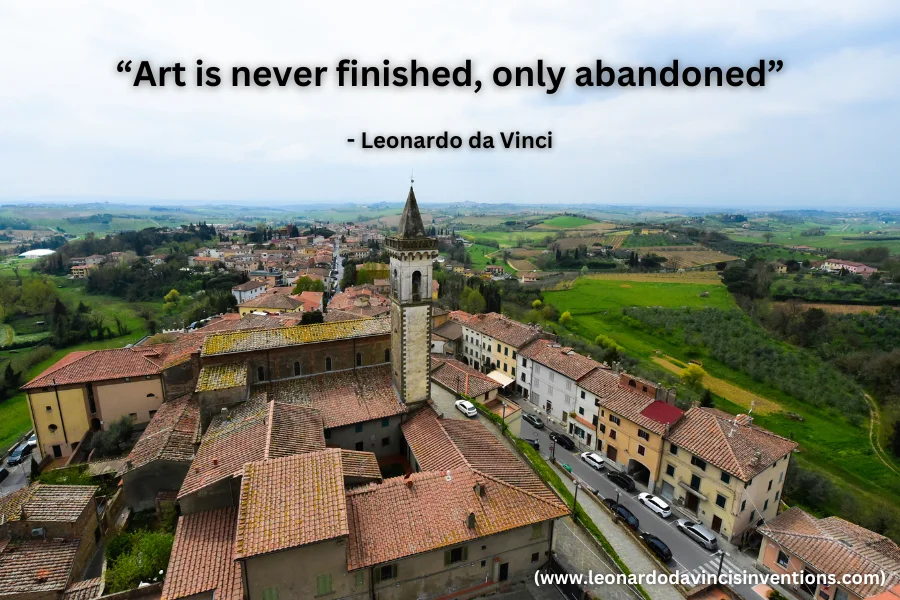
Why does the eye see a thing more clearly in dreams than the imagination when awake?
The quote suggests that Leonardo believed that the eye sees things more clearly in dreams than when the imagination is awake. This is likely because when we dream, our mind is heightened with creativity and imagination. This allows the mind to process visual information differently, resulting in more vivid and detailed perceptions
Where there is shouting, there is no true knowledge
The quote implies that true knowledge cannot be obtained through force or coercion but through calm and rational discussion. Leonardo likely believed that shouting or raising one’s voice is a sign of emotional agitation and lack of reason rather than a sign of confidence and certainty.
When people are shouting, they are not engaging in a rational and thoughtful discussion but rather trying to impose their views on others through force of voice rather than force of argument
It's easier to resist at the beginning than at the end
The quote implies that resisting temptation or overcoming obstacles at the beginning of a task or endeavor is easier than at the end. This is because, in the beginning, one’s willpower and resolve are strong, and one is less likely to become fatigued or worn down by the difficulties of the task.
As one progresses through the task, willpower tends to weaken, and it becomes more difficult to resist temptations or overcome obstacles
Intellectual passion drives out sensuality
The quote implies that when fully engaged in intellectual pursuits, one’s mind is occupied with higher thoughts and ideas, leaving little room for base desires or sensual impulses. It suggests that by immersing oneself in intellectual pursuits, one can overcome or suppress one’s base desires
Our life is made by the death of others
The quote reflects Leonardo’s understanding of the natural cycle of life and death and its interconnectedness. He understood that all living things are part of a larger ecosystem and that their existence is dependent on the death and decay of other living things
In rivers, the water that you touch is the last of what has passed and the first of that which comes; so with present time
The quote compares the flow of time to the flow of water in a river. Just as the water in a river constantly moves, the present moment is always slipping away and being replaced by the future.
The quote suggests that the present moment is a fleeting and transitory thing and that it is crucial to make the most of it while it lasts
Blinding ignorance does mislead us. O! Wretched mortals, open your eyes!
He urges people to open their eyes, suggesting that gaining knowledge and understanding will help us to see things more clearly and make better choices. He also implies that the current state of people is “Blinding ignorance,” which is leading them to make wrong decisions, so they should open their eyes and educate themselves to make the right ones
You can have no dominion greater or less than that over yourself
He emphasizes that one should focus on mastering oneself and one’s actions rather than trying to control others. This quote also emphasizing the importance of self-discipline, self-awareness, and self-regulation to lead a successful and fulfilling life
There are four Powers: memory and intellect, desire and covetousness. The two first are mental and the others sensual. The three senses: sight, hearing and smell cannot well be prevented; touch and taste not at all
The mental powers are memory and intellect, which are related to the ability to recall and understand information. The sensual powers are desire and covetousness, which are related to physical needs and wants
Every action needs to be prompted by a motive
This quote is often attributed to the famous artist, scientist, and inventor Leonardo da Vinci. He is known for his observations and insights on human behavior and motivation, which he recorded in his notebooks
The natural desire of good men is knowledge
He propounded the idea that knowledge and understanding were the keys to success and fulfillment in life. He believed that the pursuit of knowledge was a natural and innate desire of good men and that it was essential to the development of the human mind and spirit
Just as courage imperils life, fear protects it
In his notebooks, Leonardo wrote extensively about the role of fear and courage in human life. He believed fear is a natural and necessary emotion that helps protect individuals from danger. He thought that it is an instinct that helps people avoid dangerous situations and make safer choices
The Medici created and destroyed me
It is not a statement that is historically attributed to Leonardo da Vinci, but it’s possible that it could have been said by an artist or any other person who had a close relationship with the Medici family
Nature never breaks her own laws
He believed that nature was a harmonious and orderly system and that everything followed a set of consistent and unchanging laws. He wrote, “Nature is the source of all true knowledge. She has her logic, her laws, she has no effect without cause nor invention without necessity”
Common Sense is that which judges the things given to it by other senses
In his notebooks, Leonardo wrote extensively about the nature of human perception and the role of the senses in understanding the world. He believed that the five senses (sight, hearing, touch, taste, and smell) were the primary means by which humans gained knowledge about the world and that common sense was the ability to make judgments and decisions based on the information provided by these senses
Men of lofty genius when they are doing the least work are most active
In his work, Leonardo demonstrated a remarkable ability to think deeply and creatively about various subjects. He was known for his ability to make connections between seemingly unrelated fields of study and for his ability to generate new ideas and insights. He wrote, “Art is never finished, only abandoned”
It is better to imitate ancient than modern work
The reasoning behind this statement is that the art and architecture of the past have stood the test of time and have proven to be enduring and meaningful. By studying and emulating these works, artists can learn from the techniques and principles used by the masters of the past and apply them to their work
Experience does not err. Only your judgments err by expecting from her what is not in her power
However, our judgments and expectations of experience can be flawed, leading us to make incorrect assumptions or conclusions. For example, if we expect a particular outcome or result from an experiment, we may overlook or misinterpret data that does not align with our expectations
Life well spent is long
The quote implies that one can make the most of one’s life by meaningfully and fulfilling it. For example, by pursuing one’s passions and interests, making a positive impact on the world and the people around us, seeking knowledge and self-improvement, or living with purpose and intention. Such a life is likely to be filled with memorable and satisfying experiences, which will make it feel longer and more meaningful
The senses are of the earth, the reason stands apart from them in contemplation
The statement implies that our senses are how we perceive and understand the physical world around us. They allow us to see, hear, touch, taste, and smell the world and provide information about it. However, the senses are limited by their nature and can be deceived by appearances
The truth of things is the chief nutriment of superior intellects
The quote implies that the pursuit of truth is a fundamental aspect of intellectual development, as it allows us to understand the world and our place in it on a deeper level. It also suggests that the more developed our intellects are, the more we can comprehend and appreciate the truth
All knowledge which ends in words will die as quickly as it came to life, with the exception of the written word: which is its mechanical part
The quote implies that knowledge only passed on through oral tradition is ephemeral and quickly forgotten. This is because verbal communication is subject to human memory’s limitations and the listener’s interpretation.
In contrast, written knowledge is permanent and can be passed on from generation to generation
The poet ranks far below the painter in the representation of visible things, and far below the musician in that of invisible things
The quote implies that painting and music are superior art forms to poetry when it comes to representing the world around us and the world of the invisible. Painting, as a visual art form, can directly depict the physical world in a way that poetry cannot.
Music, as an auditory art form, can convey emotions, moods, and intangible concepts in a way that poetry cannot
Each man is always in the middle of the surface of the earth and under the zenith of his own hemisphere, and over the centre of the earth
The quote implies that Leonardo understood the concept of the earth as a sphere and was aware of the relative positions of the earth, sky, and individuals on its surface. The quote also implies that he understood the concept of hemispheres, which are half of a sphere
Our body is dependent on Heaven and Heaven on the Spirit
The quote implies that Leonardo believed that the human body is intimately connected to the natural world and that the natural world is, in turn, connected to something spiritual or transcendent. He may have been expressing the idea that the human body is dependent on the forces of nature, such as the movement of the stars and planets, and that these forces are, in turn, connected to something spiritual or divine
Final Thoughts
Leonardo da Vinci’s wisdom, encapsulated in his quotes and personal motto, has a profound impact even today. His relentless pursuit of truth, appreciation for simplicity, and diligent attention to detail are valuable lessons for our modern world.
Whether an artist striving for authenticity or a scientist probing the mysteries of the universe, everyone has something to learn from Leonardo’s wisdom.
One great example of Leonardo’s lasting impact is in education, where Leonardo da Vinci’s integrated, holistic learning continues to inspire educational reform movements worldwide.
His views on the interconnectedness of knowledge and the importance of curiosity are more relevant than ever in our rapidly evolving world.
Frequently Asked Questions
Leonardo da Vinci’s quotes cover various aspects of life, art, nature, and personal beliefs. His words resonate because they convey timeless wisdom and insight into human curiosity and creativity.
What is Leonardo da Vinci’s most famous quote?
One of Leonardo da Vinci’s most famous quotes is, “Simplicity is the ultimate sophistication.” This reflects his appreciation for clarity and elegance.
What is the most famous quote ever said?
The title of the most famous quote ever said is subjective and varies. However, some widely recognized options include “I think, therefore I am” by René Descartes and “To be, or not to be” from Shakespeare’s “Hamlet.”
What was Leonardo da Vinci’s quote about nature?
Leonardo da Vinci famously stated, “Nature is the art of God.” This highlights his admiration for the natural world and its divine complexity.
Did Leonardo have a wife?
Leonardo da Vinci never married. He dedicated his life to his work and studies, focusing on art and science.
What were Da Vinci’s last words?
There is no definitive record of Leonardo da Vinci’s last words. Speculation suggests he expressed regret about his incomplete work.
What is the most famous art quote?
A well-known art quote is Picasso’s “Every child is an artist. The problem is how to remain an artist once we grow up.” This emphasizes the innate creativity within everyone.
What is Leonardo da Vinci’s most famous piece?
Leonardo da Vinci’s most famous artwork is the “Mona Lisa.” It is renowned for its enigmatic expression and artistic mastery.
What is the quote from Da Vinci Code?
In “The Da Vinci Code,” the phrase “so dark the con of man” is highlighted. It underscores themes of secrecy and deception.
Who is Leonardo da Vinci in simple words?
Leonardo da Vinci was an Italian Renaissance artist, scientist, and inventor. He is famous for his contributions to art and science and his forward-thinking ideas.
What did Leonardo da Vinci say about death?
Leonardo da Vinci once said, “As a well-spent day brings happy sleep, so a life well used brings happy death.” This reflects his view on living a fulfilled life.
 I’m Leonardo Bianchi, the mind behind Leonardo da Vinci's Inventions. Thanks for visiting.
I’m Leonardo Bianchi, the mind behind Leonardo da Vinci's Inventions. Thanks for visiting. 